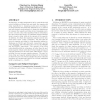Free Online Productivity Tools
i2Speak
i2Symbol
i2OCR
iTex2Img
iWeb2Print
iWeb2Shot
i2Type
iPdf2Split
iPdf2Merge
i2Bopomofo
i2Arabic
i2Style
i2Image
i2PDF
iLatex2Rtf
Sci2ools
114
click to vote
MOBIHOC
2009
ACM
2009
ACM
MotionCast: on the capacity and delay tradeoffs
In this paper, we define multicast for ad hoc network through nodes' mobility as MotionCast, and study the capacity and delay tradeoffs for it. Assuming nodes move according to an independently and identically distributed (i.i.d.) pattern and each desires to send packets to k distinctive destinations, we compare the capacity and delay in two transmission protocols: one uses 2-hop relay algorithm without redundancy, the other adopts the scheme of redundant packets transmissions to improve delay while at the expense of the capacity. In addition, we obtain the maximum capacity and the minimum delay under certain constraints. We find that the per-node capacity and delay for 2-hop algorithm without redundancy are (1/k) and (n log k), respectively; and for 2-hop algorithm with redundancy they are (1/(k n log k)) and ( n log k), respectively. The capacity of the 2-hop relay algorithm without redundancy is better than the multicast capacity of static networks developed in [3] as long a...
Related Content
| Added | 25 Nov 2009 |
| Updated | 25 Nov 2009 |
| Type | Conference |
| Year | 2009 |
| Where | MOBIHOC |
| Authors | Chenhui Hu, Xinbing Wang, Feng Wu |
Comments (0)

